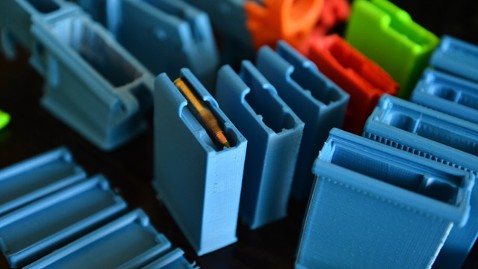Welcome to the Age of the Printed (Gun) Magazine

Plastic ammunition magazines for guns, made with a 3-D printer. Jahi Chikwendiu/The Washington Post via Getty Images.
Tech-savvy gun enthusiasts could easily find a way around any new curbs on firearms: If they want something, print it.
A Texas law student who used a 3-D printer to fashion a plastic magazine and then posted his ensuing trip to the firing range online got more than 280,000 views on YouTube - but then his leased 3-D printer was confiscated by a jittery manufacturer.
3-D printers are often used to make consumer items like jewelry and hearing aids, and also help reduce waste in manufacturing, according to Alyssa Reichental of 3D Systems Corporation, which manufactures 3-D printers for sale worldwide.
President Obama cited the innovative power of 3-D printing during his State of the Union speech last week, saying it would "revolutionize the way we make almost everything." A 3-D printer is a bit like a conventional printer, but instead of using ink on paper, it deposits layers of resin or other material that will harden to make a three-dimensional object.
Get more pure politics at ABCNews.com/Politics
But a larger portion of his speech was devoted to his desire to enact new firearm restrictions. Sen. Dianne Feinstein, D., Calif., proposed legislation in January that would ban the manufacture, sale, possession or transfer of any ammunition magazines that hold more than 10 bullets. That would presumably include home-manufactured magazines made with 3-D printers.
University of Texas law student Cody Wilson says he opposes any such restrictions. He's the activist who put up the YouTube video last month that showed him firing a Colt M-16 with a 30-round plastic magazine made by a 3-D printer.
Government actions on gun control are merely symbolic, according to Wilson.
"We hope to make the issue relevant," Wilson said. Government leaders "act like passing a law will keep magazines off the street but we want to show them that magazines will always be on the street."
Wilson runs an organization called Defense Distributed, which aims to spread information on how to create printable guns.
Wilson's actions have prompted some printing companies, like the major 3-D printing company Stratasys, to take action. Stratasys said it believes Wilson used its property for "illegal purposes."
The company leased a machine to Wilson last year but later confiscated it after learning what Wilson planned to do with it, according to a report in The Washington Post. Another company, MakerBot, also removed gun designs of downloadable blueprints it maintains for 3-D printer users, according to the report.
The printers are intended to be used to create consumer goods like Invisalign, according to 3-D Systems Chief Marketing Officer Cathy Lewis. She said 3-D printing is already becoming commonplace in communities across America.
"3-D printing ought to be used for educational purposes," said 3D Systems Chief Marketing Officer Cathy Lewis. "There is no way to deny access to a product that we make affordable and easy to use, but we make sure we are not assisting in products that could be printed or used for illicit or non-authorized purposes."